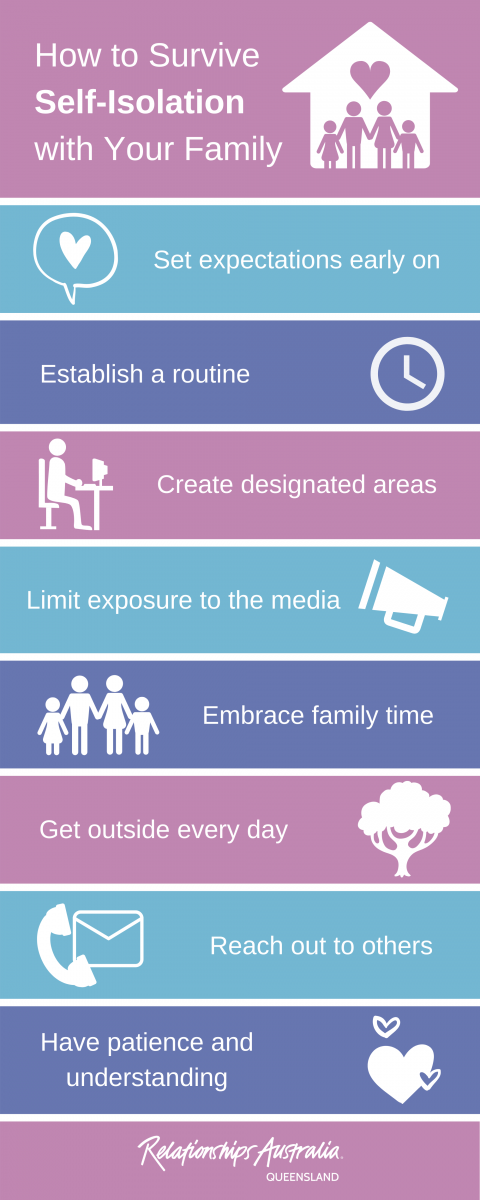

Does self-isolation have your family climbing the walls?
Being holed up at home with your loved ones can put a strain on relationships, especially when concern about the recent health situation already has emotions running high.
Whether you’re herding toddlers or teenagers, or looking after your elderly parents, there are several strategies that can help keep your family hopeful and happy while under one roof.
We hope these tips help you maintain positive family relationships throughout these trying times.
Set Expectations Early On
No one’s sure how long this whole self-isolation thing will last, so it’s important everyone is on the same page with how it will work.
Sit the kids down to talk about how their days will look and what’s expected of them. For example, they may be required to help with chores, do their homework at a certain time, and avoid entering your workspace when the door is closed.
Ask your children for input in creating family rules – this way, they’ll be more likely to follow them.
Establish a Routine
Life as we know it has been turned upside-down. Having a daily routine can help children feel safer because they know what to expect. Maintain as much ‘normal’ as you can by establishing daily routines for things like sleeping, eating, work, chores, and activities.
Wake up at a reasonable time, eat breakfast as a family, get out of your pyjamas, and start your day. Whatever your daily routine looks like, the certainty and consistency of this structure can bring comfort to you and your kids during these uncertain times.
Create Designated Areas
Being in each other’s pockets at all times is bound to exacerbate any tension you might be feeling. Designate different areas of your house to different family members and/or uses (e.g. work, play, homework) to ensure you all have the space (and privacy) to complete tasks without interruption.
When you’re stuck in close proximity with each other, it’s important to find time to be by yourself. We recommend creating a space for ‘time out’, where family members can take a break to read a book, watch a TV show, or journal alone.
Limit Exposure to the Media
While it’s important to stay informed, overexposure to negative news and media coverage of the coronavirus can cause unnecessary anxiety and panic for you and your family.
Try to limit check-ins and avoid unreliable sources fuelling fear, and keep talk about the topic to a minimum around the house. If your kids have questions, answer them honestly, factually and age-appropriately – but try not to focus all your family conversations on the coronavirus.
Embrace Family Time
Being so accessible to each other every day can make it easy to forget to find quality family time and focus on emotional connections.
See self-isolation with your family as an opportunity to nurture your relationships and enjoy each other’s company with fun activities and games such as:
- Movie nights
- Board games
- Puzzles
- Reading together
- Arts and crafts.
Get Outside Every Day
Being cooped up with your kids and family can quickly lead to cabin fever. Pencil in an outdoors adventure every day to enjoy the physical and mental health benefits of nature.
Whether you’re gardening, going for a walk, playing with the dog, or doing an at-home workout, take at least 30 minutes to ditch the four walls and take in the fresh air, open skies, and sunshine.
If you’re deemed to be in the ‘high-risk’ category or simply not comfortable venturing outdoors at the moment, try simply opening up your windows for some natural light and a welcome breeze instead.
Reach Out to Others
Craving contact with the outside world? Reach out to friends and relatives every day via text, phone call, or video chat to give and receive support.
Chances are your kids are missing their friends, too. If you have small children without devices, set up virtual playdates using FaceTime or Zoom so they can stay in contact and play with other kids.
Have Patience and Understanding
With the current disruption to normal routines and physical health threat, some behaviour issues are to be expected.
Remember that we’re all in this together, and family members cope in different ways. You’ll likely to see moments of each other where you’re not at your best, and that’s OK. Approach disagreements with patience and empathy, and try not to hold grudges.
Prioritise Your Mental Wellbeing
It’s understandable to be feeling anxious and distressed during the coronavirus outbreak – and being stuck at home with the family can make daily life even more overwhelming.
If you’re struggling to cope on your own, help is available.
Relationships Australia Queensland provides free and confidential telephone counselling for all family members.
You can call 1300 364 277 between 8am-8pm to get professional help managing your stress and anxiety.
Check out our article How to Protect Your Emotional Wellbeing in the Coronavirus Outbreak for more practical tips.

Back to all posts